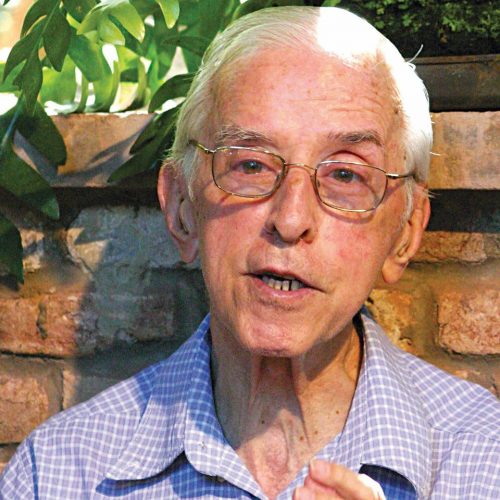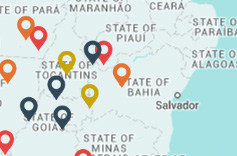 At the age of 92, Bishop Emeritus Dom Pedro Casaldáliga of the Prelature of São Félix do Araguaia, Mato Grosso, passed away on the morning of August 8, in the city of Batatais, SP. Known internationally for his tireless defense of human rights, agrarian reform, the Amazon and the rights of indigenous peoples, Dom Pedro Casaldáliga was one of the founders of the Brazil Human Rights Fund in 2006.
At the age of 92, Bishop Emeritus Dom Pedro Casaldáliga of the Prelature of São Félix do Araguaia, Mato Grosso, passed away on the morning of August 8, in the city of Batatais, SP. Known internationally for his tireless defense of human rights, agrarian reform, the Amazon and the rights of indigenous peoples, Dom Pedro Casaldáliga was one of the founders of the Brazil Human Rights Fund in 2006.
Dom Pedro was born in the region of Catalonia, Spain. Having moved to Brazil in 1968, he adopted the country as his own and dedicated his life to the defense of the rights of marginalized Brazilians in rural areas. Installing himself in the Amazon, from the 1970s onwards he saw the agricultural frontiers expand to the Brazilian Midwestern and Northern regions, witnessing the growing forest devastation and the threats to local populations.
An icon of Liberation Theology, his motto “nothing to possess, nothing to carry, nothing to ask, nothing to silence and, above all, nothing to kill” inspired and guided all his work as a religious leader and defender of the right to land of indigenous, Maroon, riverside peoples and rural workers. For over five decades, he used his voice to denounce slave labor, the degradation of the environment and land conflicts. “It is necessary to have the possibility of living with dignity off the land, in order to extinguish slave labor, underemployment and cheap labor in rural areas,” he said.
Writer and poet, Dom Pedro Casaldáliga leaves a legacy of more than 100 works that he authored or co-authored. Less than two years after arriving in Brazil, in the midst of the military dictatorship, he published Slavery and Feudalism in Northern MatoGrosso, in which he denounced the terrible working conditions faced by peasants. Translated into several languages, the publications have always been an instrument of his activism, addressing Liberation Theology, hope and the struggle for a just and peaceful world.
His poetry was present even in the messages sent to the Fund Brazil team, who always received, in verse, words of encouragement and inspiration for the work in defense of rights.
Dom Pedro was persecuted throughout his life because of his resistance to human rights violations. During the military dictatorship in Brazil, he was the target of five deportation proceedings. At the time, he counted with the intervention of the Archbishop of São Paulo, Dom Paulo Evaristo Arns. “The repression itself stimulated our responsibility over the whole scenario. It was essential todiscuss land issues, censor the government, and criticize the police. That which was evident to our conscience could become a cry for others who were seeking liberation”, he once recalled.
Even with the country’s democratic recovery, attempts to intimidate him did not diminish. In recent years, he had suffered several death threats.
He believed that the Brazil’s development model is wrong: “All major projects, by definition, are quintessentially unpopular and uneconomic. They are for the accelerated accumulation of capital and investment. For the people, the normal pace of life will be missed, while the white elephants remain around, such as the crossing of the São Francisco and Belo Monte rivers. It is the obsession for the great and the immediate”, he reflected. In an interview with the Fund’s team in 2011, he was emphatic in stating:
“We have continued to be a latifundium for 500 years. We remain with exclusion, violence and accumulation of landin the rural areas. We remain an agribusiness; the latifundium dressed up. We remain toxic, depredatory”.
In recent years, although Dom Pedro believed that a new awareness of human rights was being created, he knew “that, to some extent, human rights are still the luxury and privilege of a few who see themselves as more human than other humans. On the other hand, when the conditions of human life are very precarious, human dignity itself is prohibited; there are many people who live thinking solely about survival”.
Dom Pedro’s importance to the field of human rights is undeniable. But for the Brazil Fund, Dom Pedro also represents permanent affection and dignity, in the figure of the man who lived his principles to the fullest. His absence will no doubtleave a void, but his teachings will continue to inspire each of us.
The Brazil Human Rights Fund is deeply saddenedby the death of its beloved founder. Our entire team now joins the people with whom Dom Pedro Casaldáliga walked together throughout his life in order to revere his legacy.
Long live Pedro Casaldáliga!







